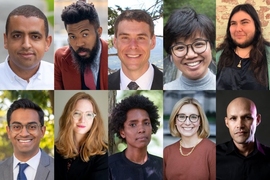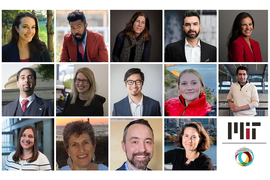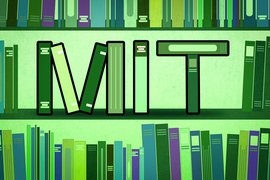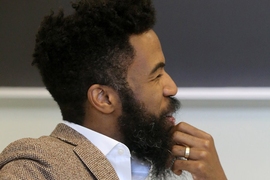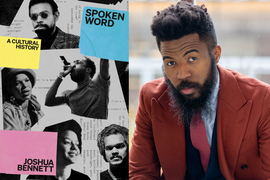Introduction
Joshua Bennett is a professor of literature and Distinguished Chair of the Humanities at MIT. Additionally, he is an accomplished spoken word artist and the author of several books. In this episode, he speaks with MIT President Sally Kornbluth about the power of words, the beauty of quiet things, and the value of learning for its own sake. Plus, we hear him perform his poetry.
Links
Timestamps
Transcript
Sally Kornbluth: Hello, I'm Sally Kornbluth, president of MIT, and I'm thrilled to welcome you to this MIT community podcast, Curiosity Unbounded. Since I arrived at MIT, I've been particularly inspired by talking with members of our faculty who recently earned tenure, or who recently arrived here at MIT. Like their colleagues in every field here, they're pushing the boundaries of knowledge. Their passion and their brilliance, their boundless curiosity, offer a wonderful glimpse of the future of MIT.
Today my guest is Joshua Bennett. Joshua is a professor of literature and distinguished chair of the humanities at MIT. He's also an accomplished author and performer who brings his poetry alive, both for his students and for those who've experienced his performances. Joshua, I'm excited to talk to you today. Thank you for being here.
Joshua Bennett: Of course, thanks for having me.
Sally Kornbluth: You wear multiple hats here. You're a professor, you're an artist, you're a performer. Do you identify with one of those more than the others?
Joshua Bennett: That's a great question. The professor part is the most recent addition to my coterie of hats. I love that image, that's great. I've been an artist my entire life. My mother still has a shoebox full of my poems, from when I was four and five years old, under her bed in her new home in Cortlandt Manor, New York. When I was a little boy, my whole family would gather around me after church. I would improvise these sermons for 30 to 40 minutes. They would do the whole thing, the whole congregational performance. They would say amen and clap. It was kind of incredible. I knew from that stage that I had a voice and I had a critical viewpoint and that I could step out in the world and perform and still come out on the other end alive, which is a pretty incredible lesson for a four-year-old.
Sally Kornbluth: What things were you opining on as a four-year-old?
Joshua Bennett: Jonah was my favorite, I think, from the biblical tradition. I always loved whales and animals. I mean, my dissertation was on animals. I realize now that bright line has always been there, so Jonah was a big one for me. Samson was big. Then Joshua, my namesake. The idea that music could break down walls, I thought that was pretty incredible.
Sally Kornbluth: There you go. I always used to laugh at my own children doing very complicated skits.
Joshua Bennett: Together?
Sally Kornbluth: Together, yes.
Joshua Bennett: That's amazing.
Sally Kornbluth: Or with their friends.
Joshua Bennett: Wow.
Sally Kornbluth: Same idea. You manifest your traits very early on.
Joshua Bennett: Sure. My big sister taught me to read and she did that through a dramatization. My grandmother was a cosmetologist and so my sister would take wigs from her salon and we would have the wigs and the costumes and the whole thing. That's how I entered literature, it was through performance.
Sally Kornbluth: That's fantastic.
Joshua Bennett: That's always been a big part of my life, the artistry.
Sally Kornbluth: Looking at your website, your CV, your many, many accomplishments, what does success feel like for you? Do you feel like you're successful now?
Joshua Bennett: Wow, that's quite the second question. Let me mull that over for a second. Do I feel successful? I feel like I've achieved most of what I set out to achieve professionally, actually. Which is an incredible feeling. I just turned 35 over the weekend. Honestly, I think I measure success differently now as a father and as a community member. I first came to MIT eight years ago as a SHASS predoctoral fellow and just fallen in love with being here in Massachusetts. I'm trying to find new ways to contribute to the community. I work with the South Shore Conservatory, which does creative arts therapies with children, particularly children with disabilities. I love teaching here at MIT. My students keep me on my toes in thinking of inventive ways to enter the classroom. I guess I'm measuring success differently these days in terms of, how do I impact the people I love and the communities that they're a part of?
My son is turning three and I think as soon as he was born, I realized, "He's part of a world full of children who have all sorts of dreams for the future that I have to help build." I think maybe in this next phase of my life, that's really what I'm trying to attend to the most, is how to be successful in that realm of things.
Sally Kornbluth: That's really great. If you like that second question, here's the one that you'll really like. Do you have failures that you're proud of or that impacted you or that changed your direction?
Joshua Bennett: Oh, 100%. The first time I got up at an open mic in college at the University of Pennsylvania, I completely forgot my poem. Forgot the entire thing. I practiced it a hundred times in the mirror. I got up, I maybe remembered the first two lines, and then I think I improvised maybe two or three more.
Sally Kornbluth: You were rewriting the poem in real time.
Joshua Bennett: I just pretended that it was a haiku the whole time and then I sat down. That taught me a great deal. One, that maybe I needed to actually run the poems hundreds of times in everyday situations, which I have ever since. But it also taught me a related lesson, as to that lesson in the dining room when I was little, which is that I didn't spontaneously combust when I forgot the poem. I wasn't only as good as my best performance. In that way, that failure taught me that, okay, this is a part of my life, but it's not everything, and I don't have to measure my human value against how good a particular performance goes. I performed at the White House about two years later, and I'm glad I had that lesson before I got there. That was an instructive failure for me for sure.
Sally Kornbluth: Actually, speaking of that, that was Tamara's Opus, correct? When you performed at the White House. I did wonder watching it, how you remember all of your poetry. It just sounds like you just go through it and through it and through it.
Joshua Bennett: Yes. What I tell my students who I teach performance is that, if you can't do it in an everyday situation, you shouldn't necessarily bring it on stage. If I can't recite a poem while I'm making breakfast, while I'm showering, while I'm on a jog, then I don't put it on stage. I think that's been a really helpful lesson, thinking about the habits of your everyday life. It just bring the poem into that. If you could do a poem while you're doing cartwheel, you're good. You're all set.
Sally Kornbluth: Once you learn it, is it part of your library in your mind? Or if you're going to perform the same poem two years later, is it still in there?
Joshua Bennett: That's a great question. I've been on tour pretty consistently now for 15 years. There are old poems that I'll sometimes bring back into a show just to see if I've still got it. Even those I run one or two times before I get on stage, just because I think the moment you're too confident in it might be the moment you lose it. Maybe my parents put that in my head. I'll check in with them during family therapy this weekend.
Sally Kornbluth: I like that.
Joshua Bennett: Yes, I still practice as much as I can.
Sally Kornbluth: When you did perform Tamara's Opus—which was a piece, as I understand it, for your deaf sister—at the White House, you used sign language in a way that punctuated the words and really added to the overall impact of the piece. You have a deaf sister and I understand your father is a stutterer. You've described him as a quiet man. As a spoken word artist, how do these quiet important people in your life actually impact your work?
Joshua Bennett: They've taught me that there are many ways into human language. Both of my parents are interpreters. They started the deaf ministry at a local church. My father hosted a Bible study at the U.S. Postal Service for 40 years for both deaf and hearing people. I think my parents have always taught me this idea that there are many ways to express oneself. Sometimes it's signs. Sometimes it's symbols on the written page. Sometimes it's your voice. That voice can be a quiet voice, that voice can be a booming voice, but all of those voices and modes of expression are valuable. I'm writing a children's book at the moment called "The World is Full of Beautiful, Quiet Things". The whole premise is that there are so many quiet moments we take for granted, like a handshake between friends, like the grass between our feet, the mountains. The world is full of quietness and it deserves to be cherished. That was a major childhood lesson for me. That quietness is okay. We can meditate in quiet, we can learn in quiet, we can read quietly, but when it's time to sing or to shout, we can let that out, too.
Sally Kornbluth: You're also doing a children's book, so you're multi-talented. I'm wondering, do you also do visual arts? Are you the artist of the book or are you collaborating?
Joshua Bennett: That's a great question. I'm working with an illustrator. It's coming out with Little Brown. I'm also writing a new non-fiction book with Little Brown, which maybe we can talk about a little later. But no. I started with drawing. I drew and I was an actor first, and an occasional preacher, as you heard. But the poetry came a little bit later. I got away from drawing, maybe I should get back to it. My students here at MIT I think would put me to shame. They're quite talented visual artists I've found, actually, in my time here.
Sally Kornbluth: There are some amazing, amazing students here. It's really amazing. Talking about creativity, what's your opinion of AI-assisted creativity? People use, or try to use, ChatGPT to write poetry, they generate images that folks use in performance visuals, and I'm sure we'll see them in publication illustrations, et cetera. I'm just curious what you think of it and have you come into contact with this at MIT? Because there's so many people that are specializing in AI.
Joshua Bennett: Sure. I've thought quite a bit actually about AI in poetry. In part because I've had mentors reach out to me that have had folks contact them and say, "Now I can write a poem in your style in seconds." I think there is this understandable fear among some of the artist communities I'm a part of that there'll be a citation without payment. That the large language models are pulling from our poems on the internet and our YouTube videos in order to create these poems and scripts and things like that.
I understand that fear. But at the same time, I do think that there's a really radical potential, actually, for a human-centered AI practice, where we can think about AI as an apprentice and collaborator, as opposed to as an adversary. That's actually some of what I'm writing about now, is thinking about the right to one's own voice in the age of AI and these historical issues. Thinking about someone like Bessie Smith who had songs sold by Columbia Records after her death that she wasn't paid for during her life.
In that case, the argument made was that her voice was separate from her person. I think in the age of AI, we need to actually think about how a voice is an inextricable part of one's personhood. How do we negotiate that together and find ways to work with the AI to just enhance our reach, enhance our breadth, and bring more people in? Rather than thinking about it as an instrument of exclusion.
Sally Kornbluth: That's really interesting. As a side comment, your remarks on what part of us do we have ownership of, makes me think of the recent lawsuits and settled in favor of the plaintiffs on HeLa cells. Henrietta Lacks. The cells, in other words, that are still being used for years that were derived, I believe, from a cervical cancer line. But they were her cells. That seems to me no different from your voice, your ideas, et cetera. I think that's really interesting. Is this the non-fiction work that you alluded to?
Joshua Bennett: The non-fiction book is called "The Orbit of Our Dreaming". It's about prodigious gifts and prodigies in the black expressive tradition. Aretha Franklin, Stevie Wonder, Phyllis Wheatley from right here in Massachusetts. What I've been trying to think about is, on the one hand, how these black communal institutions trained up students to think about giftedness in a very capacious way. Promise wasn't just a promissory note.
It wasn't just what you could trade in on later to get a good job. We all had gifts that were worthy of celebration. That could manifest in you being a child preacher like [James] Baldwin or a stellar vocalist like Aretha [Franklin] or it could just manifest in you being really good in that church play. Everyone started standing up and clapping for you. So I'm thinking about that. The second major argument of the book is that there's a temporal constraint on prodigy that I think we should let go of. There are artists like Bill Traylor. It wasn't until the 80s that he really started committing to visual art and then created 1,500 stellar works of art in a row. I'm trying to think about that. How do we think about prodigious gifts across the course of one's life? Maybe open it up a bit to say, there are prodigious gifts all around us and maybe we should expand our version of giftedness so we can have a bigger beloved community.
Sally Kornbluth: There are people who have an inflection point in their lives that may be gifted in one arena and then suddenly completely change modalities.
Joshua Bennett: That's right. There's this blurred line, too, I think between madness and virtuosity or impairment and brilliance. I think, too, in the book about artists on the autism spectrum. People like Alonzo Clemons who can just see a photograph and completely create an anatomically accurate sculpture. He's had that talent. He's expressed it since he was a toddler and had a severe head injury. Thinking too about how tragedy becomes a transcendent beauty in ways that we can track and learn from. That's a lot of the new book I'm writing.
Sally Kornbluth: I remember, actually, when I was an undergraduate at Williams, there was the daughter of a faculty member who's now an adult, she's probably close to my age, named Jessy Park, who just was an exceptional artist. She was autistic. I'm just still very taken by her art. I've come upon it years later. The detail and the precision, that's part of the other aspects of autism, is just remarkable.
Joshua Bennett: It means a great deal to me. My younger brother is on the autism spectrum. Growing up to answer this question of language, once again, and really seeing Levi's gifts manifest in all these different ways. In the beginning, it wasn't speech, it was drums and his knowledge for memorizing the credits at the end of television shows. It just forces you to really reckon with both the opacity and breadth of the human mind and to be patient. It changes the way you think about time. He's not talking now but maybe he will later. Maybe we don't see his strengths here but we see it over here. We just have to look a lot closer. That's a lot of what the book is about. What would it mean to be more patient with ourselves and with our precious children, in order to create a world that has more room for all of us to thrive.
Sally Kornbluth: How does that impact your teaching in the classroom and how you treat your individual students? Presumably, in your area, there's obviously a lot more room for individual creativity in the classroom than there might be, especially at the introductory level, in an area where students really are just learning the principles, learning the facts. Later they may be able to riff variations on the theme. I would assume from the very beginning you're seeing all sorts of manifestations of creativity in your students.
Joshua Bennett: Oh, sure. Any student who's ever taken a college class with me has written poetry, because I set aside about five to seven minutes at the beginning of each session for us to write from a shared prompt. You don't have to share it out, it's not graded, but you spend time away from the velocity of everyday campus life and you just have to sit with your thoughts. You write from the perspective of a number two pencil or a rain cloud or a rhinoceros. You find yourself in that imaginative space. That's one way. But also, I think during office hours, I've really been taken aback by how many of my students confess to being an artist and talk about this real tension that they feel between the job that'll pay the bills that they're well set up for here at MIT, and these often-prodigious gifts, these incredible talents that they have in other arenas and how they negotiate that. That's been a question I think of my own life. Not in quite the same way, but my mother I think always reassured me that.. sorry, you're taking me back to this one moment. I was up for this job that I didn't get and my mom said, "Don't worry about it honey. You can always come back home and work at the post office with us." I think about that a lot. In part because she pushed me so hard in school my whole life. I thought, "Well, Ma, if I could've came back to the post office, why did I do all this?" On the other hand, it wasn't about a dominant vision of excellence. She just thought I liked school a lot. She said, "Okay, we're going to send you to the best schools you get into and you're going to work really hard," because that has its own merits. But it wasn't about social cachet. It wasn't about elite status. It was about her son pursuing his gifts and living a certain life. I think with my individual students, I've tried to share that lesson with them. You are not reducible to your grades or the job you get after MIT. We're here to explore. I think. That's why I'm here. That's why I'm not doing something else.
Sally Kornbluth: That's a really important lesson for all of our students. Because obviously, getting into MIT, many of them have been climbing and climbing and climbing their whole lives. They get here and we want them to grow personally and intellectually and to really reap all the benefits of being an MIT student without always feeling like you got to keep your eye on the prize.
Joshua Bennett: That's right.
Sally Kornbluth: I think it's an important lesson. One of the courses you teach here at MIT is called Reading Poetry: Social Poetics. I also know that you're involved in this new African Diaspora Studies program. I'm wondering what social function you think about poetry serving for African Americans, both historically and now?
Joshua Bennett: You asked this question at the perfect time. With my colleague at Harvard, Jesse McCarthy, we edit a book series for Penguin Classics called Minor Notes. Essentially, what we're doing is going back in time to dig in the crates and find minor poets in the black poetic tradition. That's part and parcel of what I want to bring here to MIT. We have such incredibly talented students, faculty, and staff here. I'm trying to reach back into history and say, "What are these voices we can recover who haven't been held up?" Who besides [Paul Laurence] Dunbar, Langston Hughes, Gwendolyn Brooks. We know some of their names. But what about George Moses Horton? Angelina Weld Grimké? These poets we're coming back to now and finding that they had incredible work and incredible stories. George Moses Horton was enslaved. He was on the campus of the University of North Carolina at Chapel Hill. He composed these poems in his head. He never wrote down anything. He would just stand out there—we talk about spoken word, he was out there proclaiming these poems every day. They eventually got written down into collections, including a book titled Naked Genius. Which I think about. In the 19th century, Naked Genius as the title of a book written by an enslaved black person in America.
Part of what's been on my mind here, in both teaching Reading Poetry: Social Poetics but also thinking about the African Diaspora Studies program here that we're trying to build, is how can we look to history to shape our vision of a more capacious future? What moral, ethical, and practical lessons do we gain from folks like Horton, folks like Angelina Weld Grimké? A queer black woman who was also a high school teacher and very invested in her students and wrote a beautiful poem for Dunbar High School, which was a remarkable educational institution in black history. That's really what I'm trying to get at every week in the classroom. Because my students are brilliant. But many of them have not had African American history at any point in their careers as high school students before they get here. Many of them don't know the Black National Anthem, Lift Every Voice and Sing. Whereas for me, I knew that before I knew The Star-Spangled Banner. I didn't know The Star-Spangled Banner until I was five or six years old because I went to this mostly black independent school in Harlem called The Modern School. The woman who founded it, Mildred Johnson, her uncle and her father had co-written Lift Every Voice and Sing Together. That's a gift I try to share with my students whenever I can.
Sally Kornbluth: That's okay because all the four- and five-year-olds in this country mangle all the words to The Star-Spangled Banner anyway.
Joshua Bennett: Anyway, right? That's exactly right.
Sally Kornbluth: Thinking back to your poems in the shoebox, do you have any recollection of either why you were interested in poetry or as you were getting older, how you continued to develop that? Because that's not the pastime of your typical 10-year-old boy.
Joshua Bennett: Yes, fair enough. I think I was always trying to find language to express the world that was in my head. I think that's part of the reason people turn to poetry now. Why we turn to poetry when people get married, when people die, and when children are born is because there are words beyond the words we have readily available to us that we nonetheless need.
I had that sense as a very young person. Part of it was I grew up around poetry. I grew up around Motown in gospel. These preachers who were 50 feet tall to me. They would talk in these beautiful tones about the grass and the trees, clapping their hands in the mountains, and the idea that the infinite was out there and that it spoke back to us. Man, I was riveted by this, even as a four- or five-year-old. My dad, who was quite quiet, was a deacon, but he wasn't quiet when he would pray. Even seeing that modal shift was very interesting. My dad would pray and people would cry. They would come up to him after church and say, "Deacon Bennett, that prayer really moved me." That took me aback. I said, "This guy barely talks." Where at home, quiet southern man from Alabama, but there's something that comes upon him when he has to enter this other rhetorical forum. I think I just thought, "I want something like that. If words can do that, if they can do what preachers do and what my father does or my big sister does when she sings in the alto section, then I have to pursue that." I think that just stuck to me for my whole life.
Sally Kornbluth: It's interesting, in listening to you and actually watching your performance, the distinction between reading poetry on the page versus hearing it, to me is pretty stark. I think the oral performance really brings poetry to life. Do you write differently when you think about you're writing for performance? As opposed to something that you think will primarily be on the written page?
Joshua Bennett: Oh, for sure. I think of them as different technologies in a way, theoretically, and also, just my process is so different. It feels like different parts of my brain. I leave different space for play on the page and in performance. Because in performance, you can't see it. You can't see the words. I often switch the words out. If you see a printed copy of any of my poems that I pull out in my spoken word shows, it'll look different from what you're probably going to hear on stage. Because I often improvise.
I'll change two whole lines, maybe even, given the day, given what's worked earlier in the show. I try to treat it like this dynamic entity. Because it's more fun that way. You do poetry like this for 15 years, you've got to find space, I think, to riff a little bit and to improvise. It's more fun. On the page, you're having a private experience that you're describing. You hear it differently in your mind. I'm trying to bury different Easter eggs there for people to track down and follow and the form is different often. The words are usually a bit longer. I think I'm a bit less polysyllabic on the stage because it's not as much fun. It takes longer.
Sally Kornbluth: Right. You've already told us all these things you're doing professionally, your service to the community, you've got your family. I hate to ask what you do in your free time because you may not have any free time.
Joshua Bennett: It's running out quickly, too.
Sally Kornbluth: I was going to say, do you have hobbies our listeners should know about?
Joshua Bennett: Yes, sure, sure. I still love to run. I have a colleague now, Tevin, who's a professional basketball player in Italy, and we hoop once a week. Which has been a lot of fun. He comes out to the suburb in Massachusetts and we play basketball here for an hour and half every week, which is a lot of fun. Honestly, catching up with my sister and talking about what we're dreaming about at a given moment, what we're working on. We've had that practice for as long as I can remember. Ever since she was translating my toddler Esperanto, back when I was young. Ever since then, we've had that practice, so that's good. Play Madden. Video games are very calming for me. And hang out with my wife Pam and watch Love Island. That's a lot of fun, too. Those are my practices outside of work.
Sally Kornbluth: I hate to put you on the spot, but I'm wondering, I'm sure that our listeners would love to hear just a few lines of something you're working on now.
Joshua Bennett: Sure, sure. I can pull something out. Let me see. I can read you one of the poems from my most recent book of poetry, which was all about becoming a dad.
Sally Kornbluth: Fantastic.
Joshua Bennett: You asked me what I was working on. I was not working on anything for about six months.
Sally Kornbluth: Sleep deprivation, you're working on.
Joshua Bennett: You know it. Six months in a row. This should take about a minute if that's okay.
Sally Kornbluth: Perfect.
Joshua Bennett: This is "Dad Poem, The New Temporality".
"No poems, not even one since the minute you were born. Now I live the thing that was the writing more intensely alongside you each day. Hours blur and are measured only in feedings. Naps just quick enough to not subtract from your later dreaming. Mom and I divide the night into shifts. Dance through the fog of sleep deficits doctors say we won't feel the weight of until wintertime. So what? Our home glows like a field of rushes, moonlight ensnared in their flax and heads. Most early mornings with you are mine. We play the elevator game and improvise lyrics, rhyming August with raucous, florist, flawless. As I write this, you rest in a graphite gray carrier on my chest. Your thinking adorned with language that obeys no order my calcified mind can express. Tomorrow, I will do the thing where I make my voice sound like a trombone and I hope you like it as much as you did today. There is no sorrow I can easily recall. I have consecrated my life."
Sally Kornbluth: That is wonderful.
Joshua Bennett: Thank you. I appreciate that a lot.
Sally Kornbluth: Just gives lovely insight into the kind of work you do and translating your emotional experience into something that the reader or audience can see. It's wonderful.
Joshua Bennett: Thank you.
Sally Kornbluth: I've really enjoyed this conversation hugely. I really am grateful for your time and I'm looking forward to seeing your spoken word work going forward.
Joshua Bennett: Thank you so much. I appreciate that a ton.
Sally Kornbluth: Fantastic.
Joshua Bennett: This is awesome.
Sally Kornbluth: To our audience, I'd love to hear what you think of these podcasts and what you'd like to hear next. Please send any suggestions you have to podcasts@mit.edu or message @mit on any social media platforms. I look forward to hearing from all of you. Thank you all again for listening to Curiosity Unbounded. I very much hope you'll join us again. I'm Sally Kornbluth. Stay curious.

